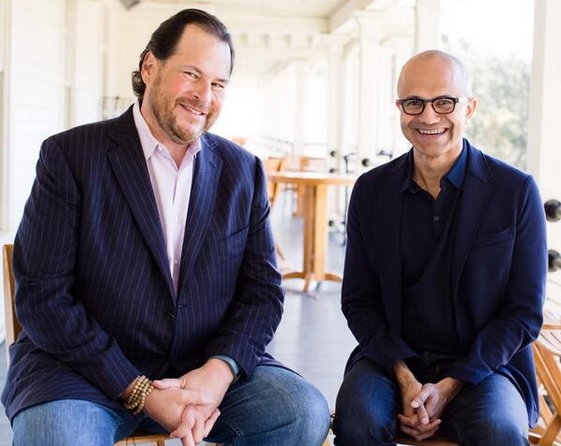If we’re to believe the rumors Bloomberg reported on Wednesday that Salesforce has engaged financial advisers to assist with takeover offers, we could be looking at the largest ever takeover in the SaaS market, and in the wider tech industry for that matter.
Regardless of how likely the acquisition may be, the market reacted on Wednesday, with Salesforce stock jumping 11.6 percent, giving it a market valuation of about $49 billion. So who on earth has the wherewithal for such an ostentatious purchase? Well, the short answer is, very few. Business Insider counts Oracle, Microsoft, Google, IBM, and SAP among the possible suitors.
They all have deep pockets for sure, but who is most likely to splash out?
If I have to make a very early call, based on extremely limited information (nobody likes a commentator who sits on the fence, right?), I would have to say that Microsoft is the most logical choice. I recently speculated that Microsoft could be in the market for cloud storage provider and rival Dropbox, given the strengthening partnership between the two, the ongoing integration of Dropbox with Microsoft’s existing cloud platform, and, perhaps more importantly, Dropbox’s superior offering and brand capital in an area where Microsoft is struggling to gain traction.
The reasons why Microsoft might be a potential buyer for Salesforce are not dissimilar. Microsoft’s Dynamics CRM solution has struggled where Salesforce has thrived, becoming synonymous both with cloud and CRM in the same way that Dropbox has become synonymous with cloud and storage and that Skype has become synonymous with video conferencing – are we seeing a pattern here?
SFDC and Microsoft
The announcement of a partnership between Microsoft and Salesforce in October 2014 was an unequivocal display of Microsoft CEO Satya Nadella’s new, more open approach to working with potential competitors and turning them into partners – not something his predecessor Steve Ballmer was ever likely to do.
Indeed, Nadella’s openness in sharing and collaborating with Marc Benioff and other big-hitters in the cloud industry has been a breath of fresh air. As in the case of Dropbox, Nadella realizes that Microsoft and Salesforce have a huge number of mutual customers and a shared goal to enable productivity and lock those customers into their solutions for good – this has led to integrations such as Salesforce1 for Windows, Salesforce for Office, and Power BI for Office 365 and Excel in recent months.
Also worthy of note is Nadella’s previous role heading up Microsoft’s cloud division and his stated ambition to transform Microsoft into a “mobile first, cloud first” organization. Who better to help with this transformation than the world’s most innovative company, which was born and has grown up in the cloud?
Now for the tabloid angle. It does appear that Nadella and Benioff have become quite friendly as of late. Benioff has spoken publicly and very positively about Nadella’s leadership, willingness to collaborate, and the improvement over his predecessor. Benioff also tweeted from Microsoft’s BUILD conference Wednesday, and the pair were together on Tuesday night at a reception for CEOs hosted by Microsoft prior to the conference. All we’re missing is a paparazzi snap of Marc and Satya leaving a trendy San Francisco restaurant together and one of those cute couple nicknames!
Benioff Tweet
On a more serious note, Microsoft not only has the motivation and the track record for such an acquisition but also the cold, hard cash. Microsoft has $95.4 billion in cash and short-term investments, far outstripping other organizations that would likely see Salesforce as a strategic fit with their existing enterprise software businesses.
Oracle has $13.7 billion in cash and a further $30 billion in marketable equities that could be liquidated quickly. IBM and SAP have $8 billion and $5 billion respectively in cash on hand. Google, with $64.4 billion, could foot the bill, but would it be a strategic move for the advertising-focused company that has struggled to gain a foothold in enterprise software to date?
And speaking of good strategic moves, would this acquisition make sense for Salesforce itself? The company can’t seem to put a foot wrong strategically, and its metrics are strong. It’s not a company that is likely to be forced into an acquisition under duress, and how would its shareholders and loyal customers react? Would the product and brand be integrated into Microsoft’s existing offering or become an extension of the Microsoft brand a la Skype?
These rumors are sure to generate lots of debate, and we will look on with interest to see how it develops.
[This story originally appeared on SaaScribe.]
Michael Cullen is cofounder of SaaScribe, an online publication with an editorial focus on the SaaS industry. You can follow him on Twitter @michaelcullen87.
VentureBeat's mission is to be a digital town square for technical decision-makers to gain knowledge about transformative enterprise technology and transact. Learn More

